Back to Jeju after 65 years, I still cannot visit my old home
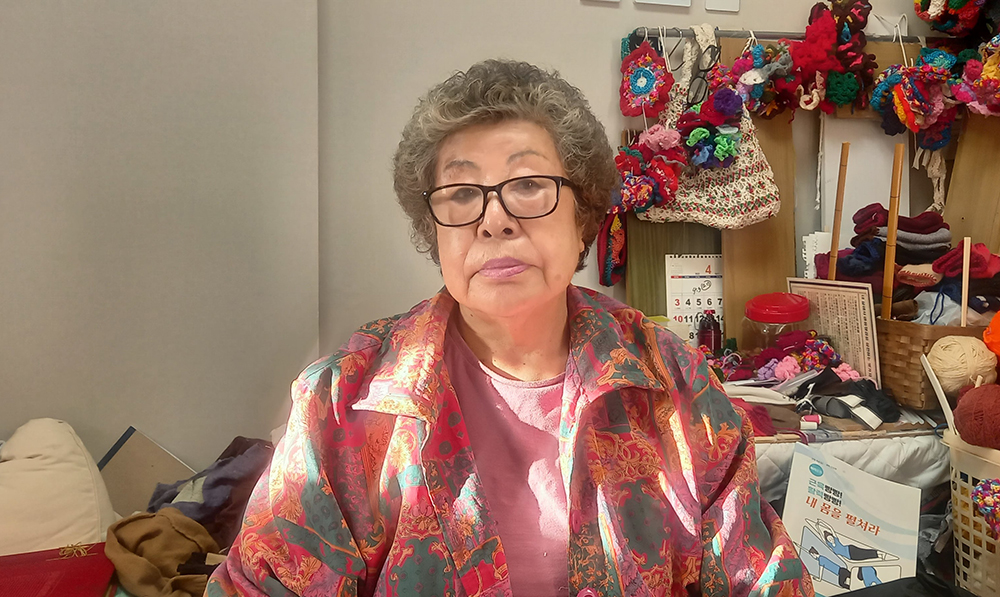
A Testimony of Jeju 4·3 by Lee, Jeong-hee (born in 1941 in Shineom, Aewol)
The Memorial Project team met Ms. Lee, Jeong-hee, for the first time at the consolation event for the survivors of Jeju 4·3 held in May 2022. Two months before the event, she had wrapped up her life in Seoul and moved to Jeju. She looked so young that it was hard to believe that she was 82 years old. We wondered what her story was like, and she told us that she had depended on a needle and a pair of scissors all her life, beginning at a textile mill in Busan and later at Pyeonghwa and Gwangjang Markets in Seoul.
Now she was back home for the first time in 65 years, but she told us she could not go back to her childhood home, or what’s left of it, in Shineom-ri, Aewol-eup. We met her again, this time for an interview.
Arranged by Cho, Jeong-hee,
Team leader of the Memorial Project team of the Jeju 4·3 Peace Foundation
An attack on Nov. 11, 1948
I still remember the exact date. It was the 11th day of the 10th month by the lunar calendar. My father had come home after plowing the sweet potato field. After dinner, my parents, my older sister, my two little brothers, Yeong-wook and Yeong-soo, and I went to sleep. That night, my mother heard someone call my dad’s first name, “Soon-il!” She knew to whom the voice belonged.
“Lee is here, so you’d better run now!”
She told my father, and he was barely in his clothes when he jumped out of the house and ran. After that, my mother pulled up the blanket and covered our faces. Feeling suffocated, I tried to pull my head out from under the blanket, but the door opened suddenly. There were shadows all over the walls of the rooms, and blades stabbed through the blanket and into my neck. I wanted to call out to my mother, but I couldn’t say anything. Hot blood surged from my neck.
There was no way I could avoid those relentless spears while I was lying down under a blanket. Pillows and blankets were useless against metal pikes. I was only eight at the time and felt death coming to me.
“Jeong-hee! Jeong-hee!”
I woke up as my sister called me. It was bright in the room, although I thought it was the dead of night. Our house was burning, and the light was bright enough to make me think it was day. My mother was bleeding badly and had been stabbed in her eye. She was lying like a dead person. My older sister and I, twelve and eight-year-old girls, dragged our mother out of the blaze. My mother’s arms were slippery because of the blood she shed.
“Jeong-hee! Hold Mom’s feet!”
With my sister holding mother’s torso and me holding the feet, we could barely drag Mother out of the house and into the yard. “Thud!” The house collapsed with an awful sound as soon as we did that. Our younger brothers, Yeong-wook and Yeong-soo, were still inside the room…
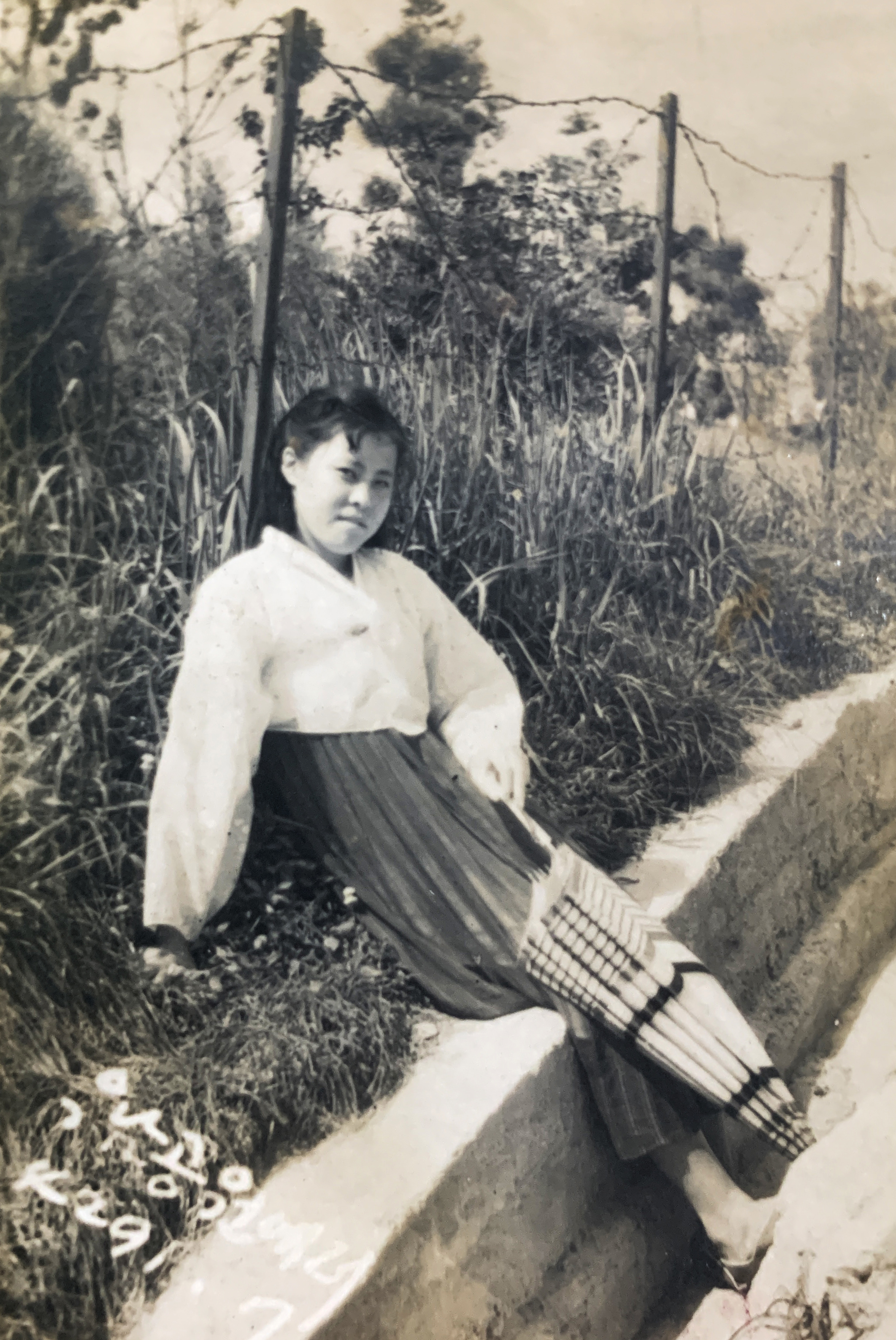
Lee, Jeong-hee at the age of 18
Two brothers, lost along with the collapsed house
It happened in no time. I could not believe the house just went down.
“Yeong-wook! Yeong-soo!”
I called them, but there was no answer. I lost my dear brothers. They were six and eight years old and were too young to die. Imagine how hot it was in the fire. Imagine their fear and pain. They may begrudge their older sisters who could not recover their bodies. I still feel that they do. My dead brothers were neither reported for the registrations of their births nor as victims of Jeju 4·3. Few people remember the deaths of my little brothers, and even those people are dying out quickly.
Crack! Crack! My mother’s hair caught on fire on the embers, as if the house burning was not enough. We tried to stop the fire by covering my mother’s face and torso with the lids of the sauce jars. My sister and I covered our heads using large bowls and sat beside my mother.
My mother, who lost an eye
At daybreak, villagers crowded around our house. My father, who had been in hiding at night, also returned home in the morning.
“My dear, are you alright?”
Stabbed 37 times all over her body, my mother was awake, and still hopeful. She did not hesitate to ask whether my father was okay. Her body was covered with scrapes and clotted blood, with her skin pierced and torn. She looked like a mushroom hanging onto a dead tree. We were sent to a hospital in Aewol on a truck.
After we got to the clinic, my mother had surgery to remove her left eye entirely. It was a small clinic inside a residential building with only one doctor and no nurse. It was not a proper operation. The doctor severed the eyeball and stitched the eyelids to close it up. That is how my mother ended up living the rest of her life with only a single eye.
“Why do you carry a sea cucumber on your neck?”
My sister was lucky because her wound was a rip in her cheek. Though the wound left a scar since it could not be adequately stitched, my sister had all her limbs intact. I had been stabbed in the back of my neck, which irritated me for a while. I could not lie down straight, so I had to lay with my knees drawn up even when I slept. I had to place either a basket between my knees or a pillow or bundle of rags between my knees to go to sleep. Was I able to get appropriate treatment for this? No. Application of the red medicine (an iodide tincture) was all I could get. The wound healed as time passed. It was just left without getting stitched up, and began to swell up and look like a sea cucumber.
“Why do you carry a sea cucumber on your neck?”
I was nervous when people asked me the question. I wore clothes with long collars so that I could cover my neck. I covered my wound with whatever I could when I had to wear clothes with short collars. I had to do so even in the middle of summer, or have my hair cover it. This went on until I turned 40 and received plastic surgery.
Caring for my mother with barley straw and a wooden bowl
I spent about a month at the clinic in Aewol. After I returned to Shineom with my mother, there was nowhere to go back to. My father rented a single house to live in with his second wife and my half-brothers. We rented a single room from our neighbor, Mr. Kim, Doo-gil. It was not a decent one. We had to cover the dirt floor with barley straw the whole winter.
“Jeong-hee, Jeong-hee!”
Once every few hours, my mother would call me desperately. Since she could not move, it must have been physically painful to maintain the same position for a long time. I had to wake up even at night when she called. I stepped on barley straw to flatten it. Then, I placed a wooden bowl which was used to scoop up grain on the straw and switched my mother’s position on it.
“Jeong-hee, would you go to your uncle’s place and get some barley straw?”
My mother had to relieve herself while lying down for a long time. Whenever she did, the place where she was lying became contaminated. I was only eight years old, but replacing the contaminated portion with new barley straw was my job.
“Uncle, Can I get more straw for my mother’s floor covering?”
As I turned back with a bundle of barley straw that my uncle gave me, Ms. Gil-dong, a neighboring wife, had been watching the entire scene and asked,
“What is it that you carry with you?”
“Well, this is for my mother’s floor covering….”
She must have felt pity seeing me carrying only a handful.
“You go ahead to your mom. I will pack up some more and see you at your place. Go on, girl.”
Ms. Gil-dong was a very warmhearted lady. She brought a huge bundle of barley straw with her. She also gave us two steamed sweet potatoes. We were able to eat for four days with the food.
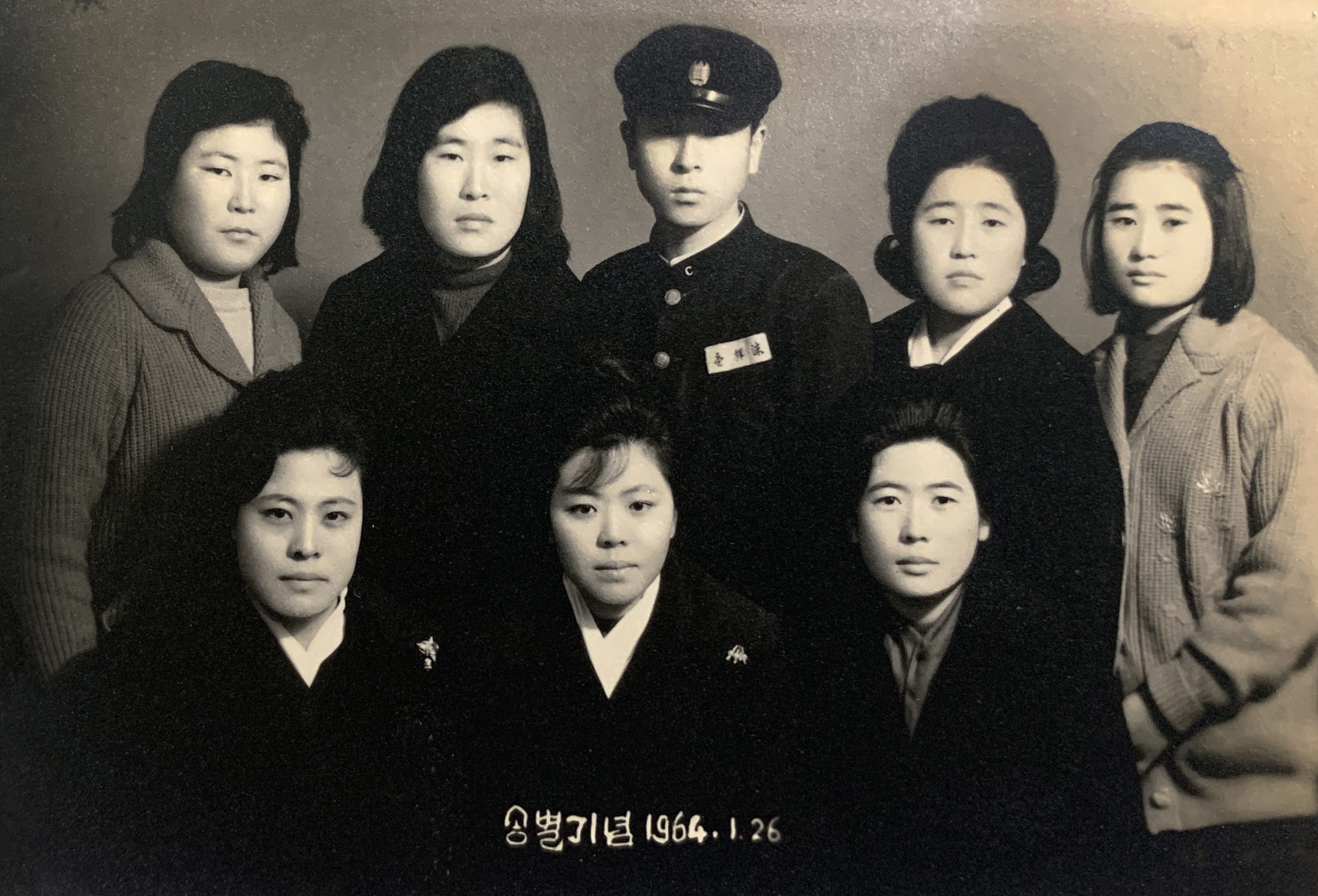
A photograph of friends from Jeju who worked in Seoul. From top left clockwise, Ha Yeong-ja, Ha Yeong-hee, Yeong-hee’s little brother, Lim Bu-ja, Lim Song-ja, Yang Jeong-soon, Ko Hee-ja, and Lee Jeong-hee at the age of 24
“Hold my head!”
Whenever the weather got windy or rainy, my mother’s eye wound ached, and she suffered from headaches. It was the aftermath. Nowadays, there are proper treatments and painkillers, but we had no such things back then.
“Jeong-hee, hold my head! Hold your mother’s head!”
She would roll from right to left, and I had to hold her tight. When she cried out in pain, I cried, too. I cried so many times and so severely that, maybe, I cried my whole lifetime’s tears then. One windy day, I was holding my mother’s head as usual. All of a sudden, my father opened the door.
“It’s going to be rainy tomorrow!”
He only looked irritated and slammed the door. He did not say a caring word to my mother when it was all his fault that Mother had to bear everything. She had to lose her eye, could not walk, and suffered in the aftermath because of him. So, I made a decision.
“I will never cry when he dies. Never!”
My father died at the age of 84. The funeral was held for five days, and I did not cry a single time. People thought of me as a “bitter” daughter, but honestly there were no tears left in me to share.
“Who is going to work if you go to school?”
I envied the kids who went to school the most. I wanted to go too. Since nobody allowed me to go to school, I went to Gueom Elementary School alone. There were kids lined up in the schoolyard, so I got in a line of children that were similar in height to me. I think it was a 3rd graders’ line. I followed the students and the teacher gave me a note. I was very excited. I came back home and told my father how excited I was. He said,
“Who is going to work if you go to school?”
I said nothing more about school to my father anymore. One day, I met with the teacher at school. I was told that my father asked the school to make me stop coming. I never thought my father would do such a thing. Nevertheless, I finished that one year. Then, my father visited the school again. He told them to make me a 6th grader so he could see me graduate and become a farmer soon. I had just finished 3rd grade, and my father wanted me to graduate as soon as possible. I discovered that my father saw me only as his workhorse!
I could not understand later on when my father supported my half-brothers’ university tuition. I can never forget what he has done to me! I still tell my brothers,
“Don’t mention Father in front of me! It’ll ruin the next 30 years!”
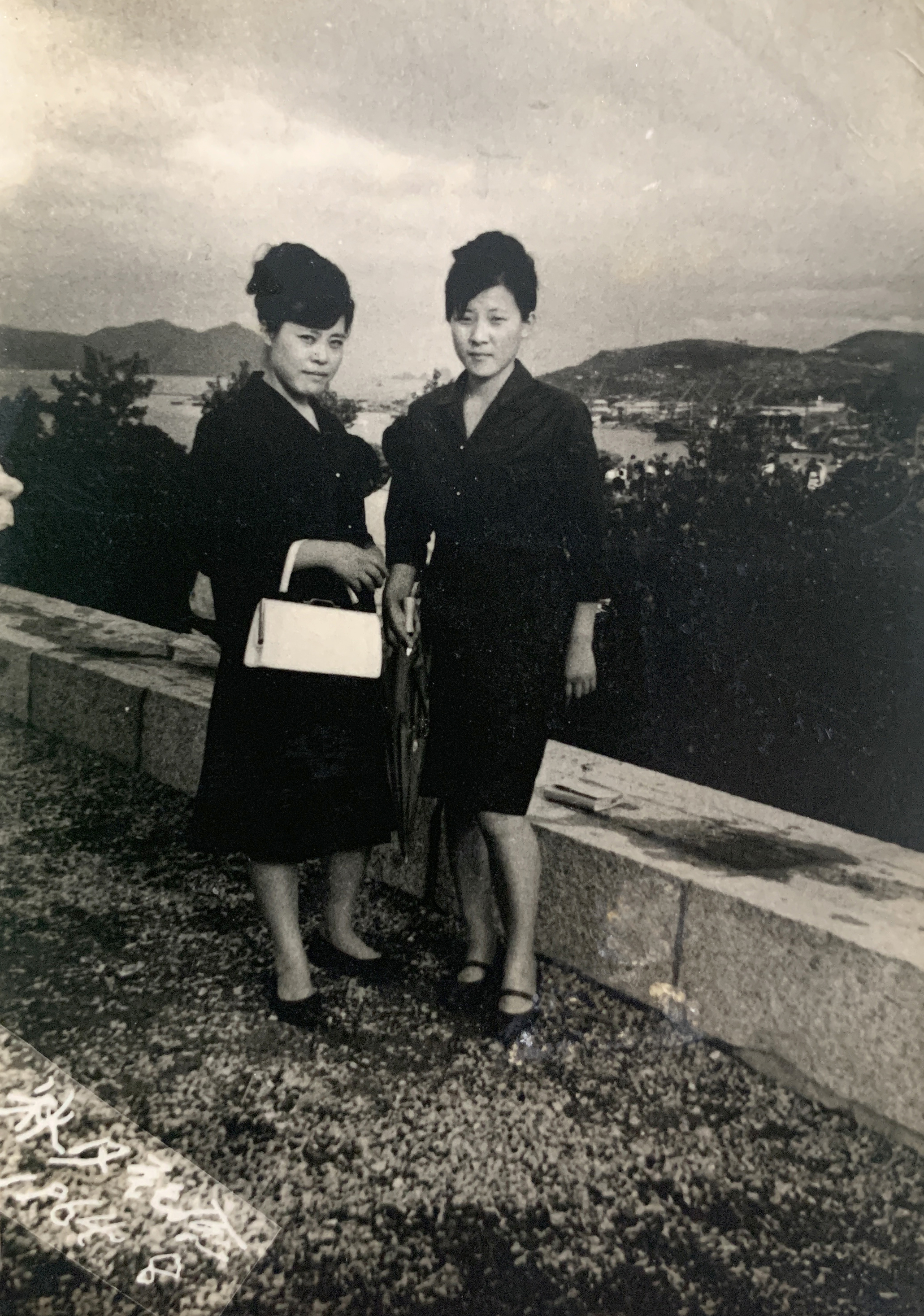
A photo taken on a trip to Nakhwaam Rock in Buyeo, Chungcheongnam-do, with a coworker from Pyeonghwa Market. Jeong-hee, in her 30s, stands on the left.
Leaving Jeju at the age of 17
I could not feed the horses and cows nor weed the fields all my life.
“ Older sister, I’m done living on Jeju. I would rather follow you to Seoul than stay here and die as a farmhand. Please take me with you.”
I asked a cousin living in Seoul to take me away from Jeju. Thankfully, she found a job for me at a textile factory in Busan. I did this without my father’s knowledge. I felt guilty leaving my one-eyed mother who could only walk with her cane, but this was about my life. Anywhere else looked like a happier place to live than Jeju. I was 17 when I hopped aboard a ferry to Busan.
I got married at 24 and could not conceive a baby for some time. I had my first period when I turned 21. I had it no more than three times a year. I went from hospital to hospital to find out why. I took any medicine that they said would help me. Maybe it was because I bled too much as a child.
My father knew nothing about my hardship. He denounced me as a worthless woman who could not bear a child and told my husband to get a “second wife” all the time. What kind of a father is he to tell his son-in-law to get a “second wife?”
For ten years, I visited hospitals, and right before I was about to give up having a baby, my daughter came to me like a miracle. After ten years of marriage, I was 34, and my daughter was the best thing that happened to me in my whole life.
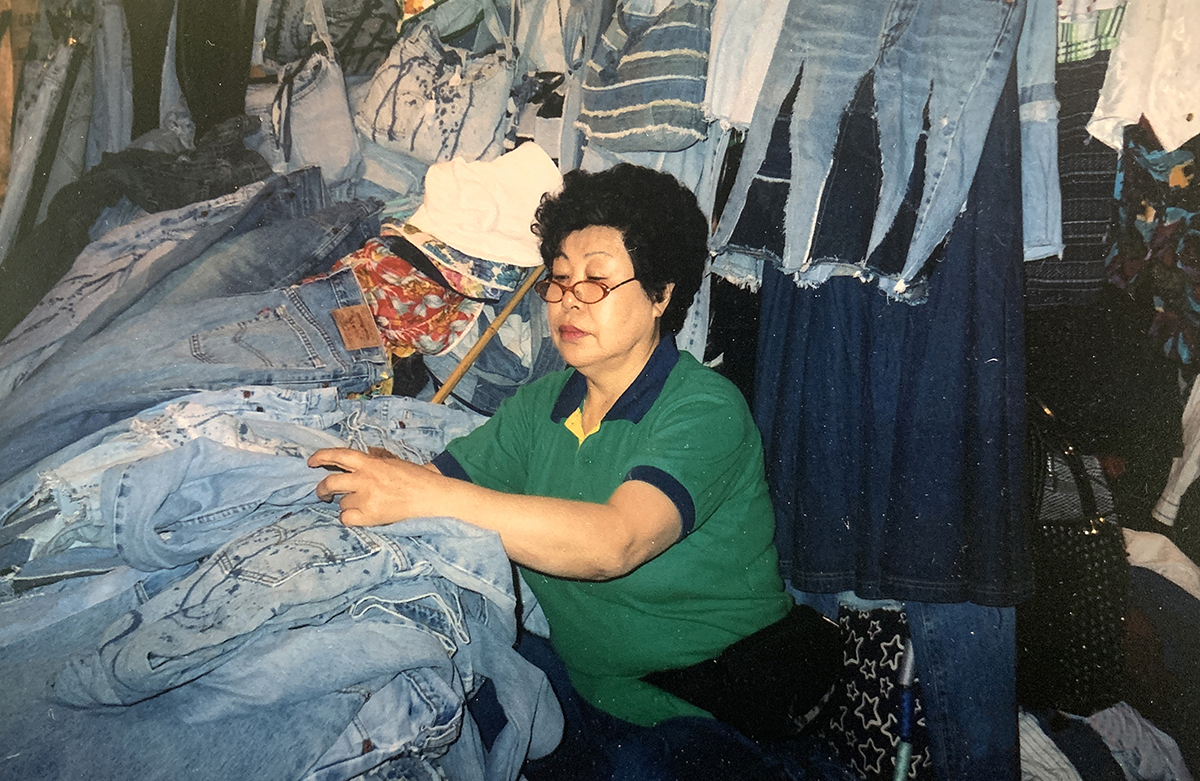
A photo taken on a trip to Nakhwaam Rock in Buyeo, Chungcheongnam-do, with a coworker from Pyeonghwa Market. Jeong-hee, in her 30s, stands on the left.
One only needed a needle and a pair of scissors to make a living in Seoul
Nowadays, all you need to know is how to use a needle and scissors to make a living. Back then, I had no technique and no education. I had to begin as an understudy at a repair shop. As time passed, I came to acquire an undershirt shop. That was the way for me into Pyeonghwa Market in Seoul.
Initially, I sold only ready-made products like SBW or BYC. At around the time when a new hotel, the Chosun Hotel, was built in Myeongdong, they asked me to manufacture a massive amount of sleepwear. From that time on, I made my own brand. I named it ‘Chowon.’
Pyeonghwa Market was the largest wholesale clothes market in Korea. It took orders from everywhere in South Korea, from Mokpo to Busan and Gangwon-do. At the time, there was a curfew, so all I could do was stay inside the shop until 4 am and make almost total sales. I even sold 800 pieces of dress a day. My shop began with two sewing machines and became a four-story factory building. My nieces, nephews, relatives, and acquaintances from home had to come and help the business because we were constantly growing. In the meantime, a rumor spread in Shineom that “Jeong-hee might not have learned much at school, but she sure is smart enough to succeed in Seoul.”
It seemed that I had nothing more to wish for. My business was successful, and my daughter was well. However, my husband strictly followed my father’s nonsensical advice to get a “second wife.” I did not see this coming. He also threw away our fortune gambling, losing our house, the building, and the factory. I separated from him, divorced, and opened a new shop in Gwangjang Market. Although I was confident in managing a business, I earned less than a third of my previous income at Pyeonghwa Market. I had to think of a breakthrough: Levi’s jeans. In the early 1990s, secondhand Levi’s jeans imported from the United States were very popular throughout the vintage shops in Gwangjang Market. I refitted those used jeans to make them fit Koreans. I reduced the waists, bleached, and distressed them to make them sell well. That was over 30 years ago.
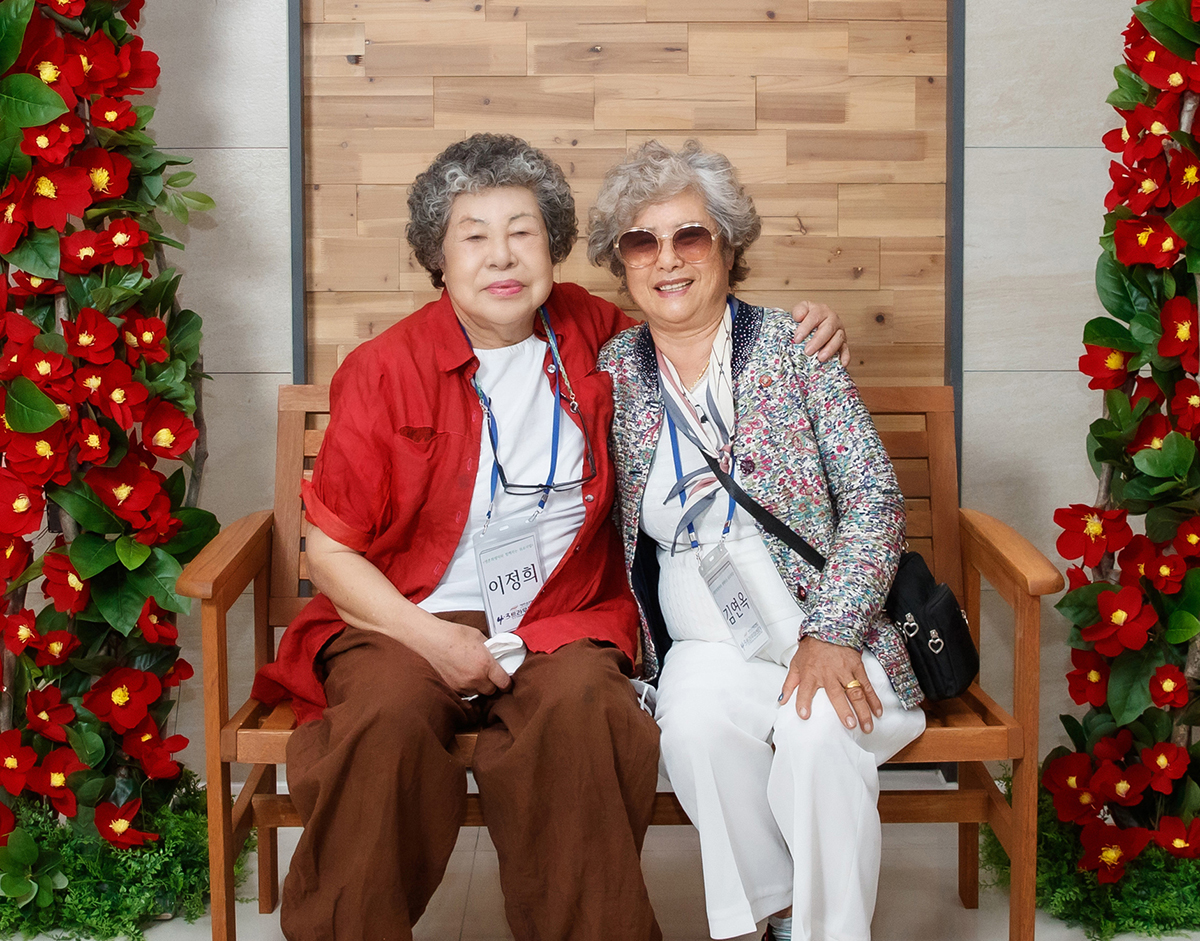
A photo taken with Ms. Kim, Yeon-ok, who became a friend during the May event at the Jeju 4·3 Trauma Center
Coming back home after 65 years
I ran my shop at Gwangjang Market until August 2021. I am over 80 years old and could wrap up my business thanks to my daughter, who was worried about my age and the pandemic. So, I came back to Jeju. I left Jeju when I was 17, so it has been 65 years since I lived here. Now there is no one left for me to see here. My mother, father, and my sister are all gone.
My mother died when she was 66. Compared to my father, she lived a shorter life. She could have seen her granddaughter if she had lived for a few more years. I fainted several times at my mother’s burial. I felt so much pity that I could not stop shedding tears. There was nothing I could do for her. I built a stone wall around her burial ground, but it still did not mean much after her death.
I still do not want to go back to my hometown, Shineom. I never want to see the burnt-down house again, the ruins of Mr. Kim Doo-gil’s house where my mother and I lived poorly, the alleys, nor the farmland I used to work on. There is no need to meet people who remember me from when I was eight. Now when I think of my mother, I sometimes see her tablet at the Jeju 4·3 Peace Park. I think that is enough for me for now.